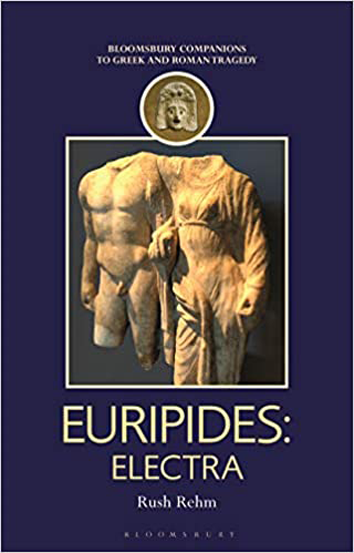
I was excited to read the latest addition to the Bloomsbury Companions to Greek and Roman Tragedy series, and was not disappointed. Rush Rehm does a fine job of making Euripides’ complicated and unsettling play more appreciable and enjoyable, and this deceptively slender volume contains much to appeal to beginners and specialists alike.
Unsurprisingly for a scholar who has not only written much-admired books on the use of space in Greek theatre, but also directed many plays (including Euripides’ Electra), Rehm pays great attention to the play's staging and production. The book is written in an accessible style that does not patronise: the reader is taught a rich array of technical vocabulary (occasionally in German academic terminology, as well as Greek). Black-and-white illustrations are a meaningful inclusion, continually prompting one to think about the play's performability — a matter clearly never far from the author's mind.
From the beginning, Euripides’ play is put into contexts of all kinds. The book opens with a concise, but thorough, chapter on the conventions of Attic drama. Aristotle is freely invoked; so too is Bertolt Brecht. There follows a detailed set of plot summaries, with a third chapter on Euripides’ treatment of the existing material from the Homeric poems onwards. (This section is mercifully free from being mired, as so many books on the Electra plays are, in unresolvable philological debates about whether Sophocles’ or Euripides’ Electra came first. Happily though, it is full of pertinent detail about content from the Oresteia that might have primed an audience's expectations.) Chapter four offers detailed character analyses, which show a great sensitivity to the demands on the actors involved in a production of the play, while Chapter five makes language its focus. This section identifies various linguistic curiosities, encouraging the reader to notice recurrent imagery, underlying themes, and metaphors that risk being lost in translation. (All quotations in Greek are transliterated.) Chapter six focuses on scenic detail, costumes, and props. Rehm vividly illustrates his ideas about gruesome matters (such as beheading and dismemberment) by thoughtful comparisons from elsewhere in Euripides’ oeuvre — including the fragmentary plays. Chapter seven addresses matters of sexuality and gender: the reader is given plenty of thought-provoking background information for understanding ancient conceptions of masculinity and femininity. Chapter eight combines discussion of the role of the divine in the play with matters of social class and heroic values in everyday life, closing with a memorable assertion:
‘One can imagine a Hollywood agent pitching Euripides’ play as an innovative hybrid — eroticized melodrama and slasher film — but one that merits a GP (‘General Public’) rating due to its classical pedigree.’ (p. 113.)
Such sentences are characteristic of the clarity of Rehm's prose, and his ability to relate salient details from the play to modern-day sensibilities.
Finally, there is a chapter, ‘Electra through the looking glass’, on the afterlives of Euripides’ play. Inevitably for an introductory volume, we could hardly expect an exhaustive survey; instead, Rehm focuses on various noteworthy examples of the play's Nachleben, namely the play's reception within antiquity and in the 20th century. (Freud and Jung receive only a brief mention, no doubt to widespread relief.) The discussion instead dwells on translations and adaptations by Gilbert Murray, Jean Giraudoux, Marguerite Yourcenar, and Eugene O'Neill.
In his writing, Rehm constantly conceives of the play as not (just) a text, but as an experience: throughout, he makes sure we never cease to imagine the play's events unfolding in space and time, of the actors reaching for their props, of the characterisation evolving, and of the audience always on edge. This volume will prove accessible as a study-guide for students who know little of Greek theatre, but also contains plenty of meaty information for their teachers to savour. I recommend this volume not just for students studying the text in translation, but for anyone considering a performance or rehearsed reading of Euripides’ play.


